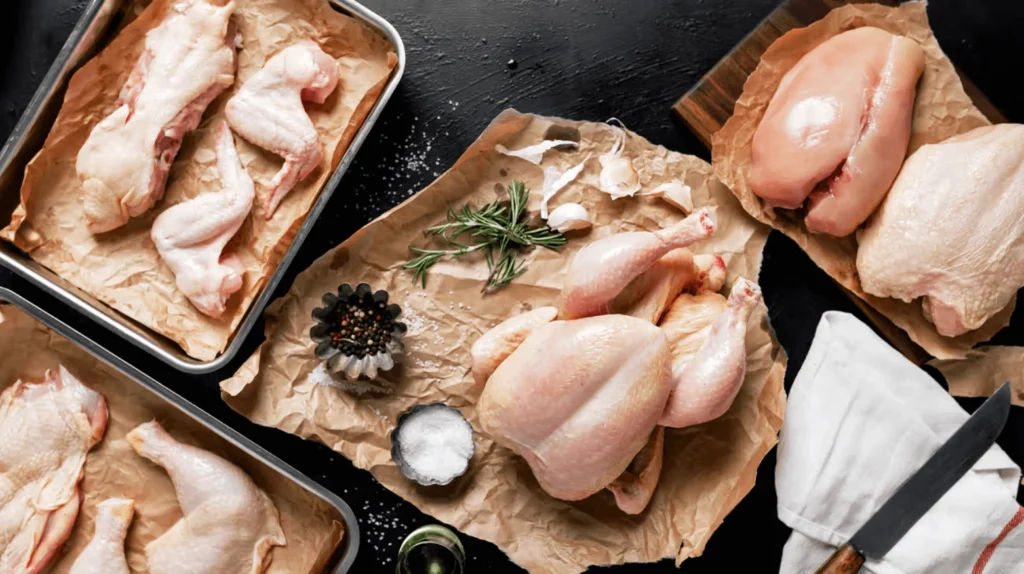Chicken breast is a lean protein powerhouse, offering a low-calorie, high-protein option that supports muscle growth, weight management, and overall health. With minimal fat and zero carbohydrates, it’s ideal for those on low-carb diets or anyone looking to maintain a healthy, balanced diet.

Content
Nutritional Breakdown of Chicken Breast
When we think of chicken breast, we often picture a protein-packed food that aids in fitness and health. But what exactly does it provide in terms of nutrition? Let’s dive into the details of this incredibly nutritious food, focusing on its calories, macronutrients, and other important health benefits.
Calories in Chicken Breast
One of the most significant aspects of chicken breast nutrition is its low-calorie count. A 100-gram serving of skinless, cooked chicken breast contains about 165 calories, making it a great choice for those monitoring their caloric intake. Whether you are looking to lose weight or simply want to maintain your current weight, chicken breast provides a nutritious option that won’t cause you to exceed your daily calorie limit.
For those concerned about the calories in different portions, here’s a breakdown:
- 3 oz serving: Approximately 140 calories
- 4 oz serving: Around 187 calories
- 6 oz serving: 280 calories
These values can fluctuate depending on cooking method. For example, grilled chicken breast nutrition tends to have a lower calorie count compared to fried versions, which may have added fats and coatings that increase the total caloric value.
Protein in Chicken Breast: A Lean Muscle Builder
When it comes to chicken breast nutrition facts, protein is undoubtedly the star. A 100-gram serving of skinless chicken breast provides about 31 grams of high-quality protein, essential for muscle repair, growth, and overall bodily function. The abundance of protein in chicken breast makes it one of the most popular food choices among athletes and bodybuilders.
Why Protein Matters in Your Diet
Protein is a key macronutrient that plays a vital role in maintaining muscle mass, repairing tissues, and supporting various bodily functions. For individuals involved in heavy physical activity or those on a muscle-building regimen, consuming adequate protein is crucial to achieving their fitness goals.
When compared to other protein sources, such as chicken thighs or plant-based options like tofu or beans, chicken breast protein stands out due to its higher protein-to-fat ratio. It’s an excellent way to meet your protein needs without consuming unnecessary fats or carbs.
Macronutrient Breakdown: Fat, Carbs, and Fiber
Chicken breast is often lauded as one of the best lean protein sources available. But what about its fat and carbohydrate content? Let’s explore the other macronutrients in chicken breast to get a fuller picture of its nutritional value.
Fat Content in Chicken Breast
A 100-gram portion of skinless chicken breast contains about 3.6 grams of fat, with only 1 gram being saturated fat. This makes it a fantastic choice for anyone looking to keep their fat intake in check while still benefiting from a rich source of protein.
In comparison to chicken thighs, which contain higher fat content (about 8 grams of fat per 100 grams), chicken breast is far leaner, making it ideal for those on low-fat diets or those simply looking to manage their fat consumption more effectively.
Carbohydrates in Chicken Breast
One of the reasons chicken breast is a favorite among people following low-carb diets like the keto or paleo diet is because it contains little to no carbohydrates. A 100-gram serving typically has 0 grams of carbohydrates. This makes it an excellent option for those who need to keep their carb intake to a minimum while still getting a significant amount of protein.
While chicken breast is free from carbs, cooking methods like breading or frying can introduce carbohydrates. It’s important to note how you prepare the chicken to maintain its low-carb status.
Micronutrients and Vitamins in Chicken Breast
In addition to protein, chicken breast is rich in several essential vitamins and minerals. It’s a good source of:
- Vitamin B6: Crucial for energy metabolism and brain function.
- Niacin (B3): Helps support healthy cholesterol levels.
- Selenium: A powerful antioxidant that aids in immune function.
- Phosphorus: Supports bone health and energy production.
These nutrients work together to promote a healthy body and can help combat nutrient deficiencies when included in a balanced diet.
Health Benefits of Chicken Breast
There’s no shortage of health benefits associated with eating chicken breast regularly. Below are some of the most significant advantages of including this versatile protein source in your diet.
Supports Weight Loss and Healthy Weight Management
Since chicken breast is low in calories and high in protein, it’s an excellent food choice for those looking to lose weight or manage their weight more effectively. Protein plays a crucial role in promoting feelings of fullness and reducing overall calorie intake, which can help prevent overeating.
Promotes Muscle Growth and Repair
For athletes or individuals looking to increase muscle mass, the high protein content in chicken breast can accelerate muscle repair and growth after workouts. The amino acids in protein are used to repair damaged muscle fibers, helping to build stronger muscles over time.
Boosts Metabolism and Immune System
The vitamins and minerals in chicken breast, such as vitamin B6 and selenium, are vital for maintaining a healthy metabolism and immune system. By incorporating chicken breast into your meals, you’re providing your body with the nutrients it needs to function optimally.
How to Prepare Chicken Breast for Maximum Nutrition
The way you prepare chicken breast can significantly impact its nutritional value. Here are some cooking methods that will help you preserve the nutritional benefits while also making delicious meals.
Grilling or Baking Chicken Breast
Both grilled chicken breast and baked chicken breast are great methods for cooking without adding excess fats or calories. By using minimal oil or marinade, you can retain the lean profile of the chicken, allowing its natural flavors to shine.
Avoiding Fried Chicken Breast
While fried chicken is undeniably tasty, it adds unnecessary calories and fat to an otherwise healthy protein source. Breading and deep-frying chicken breast introduces unhealthy fats and increases its caloric content. Instead, opt for grilling, baking, or poaching to keep the fat content low.
Flavoring Chicken Breast
For a delicious and nutritious meal, try seasoning your chicken breast with a mix of herbs and spices like garlic, paprika, and lemon zest. This adds flavor without the need for excess oils or sugary sauces.
Conclusion
In conclusion, chicken breast nutrition facts clearly demonstrate that it is one of the healthiest, most versatile protein sources available. With its low-calorie, high-protein, and low-fat profile, it can easily be incorporated into a variety of diets, from weight loss plans to muscle-building regimens. By choosing skinless chicken breast and cooking it using healthy methods like grilling or baking, you can enjoy its full range of nutritional benefits without unnecessary additives or fats.
FAQs
What are the nutritional benefits of chicken breast?
Chicken breast is an excellent source of lean protein, providing low calories, minimal fat, and no carbohydrates. It supports muscle growth, weight management, and overall health.
How many calories are in chicken breast?
A 100-gram serving of cooked, skinless chicken breast contains about 165 calories. This makes it an ideal choice for those looking to maintain or lose weight.
Is chicken breast high in protein?
Yes, chicken breast is rich in protein, with approximately 31 grams of protein per 100-gram serving. It is one of the best sources of high-quality protein.
Can chicken breast help with weight loss?
Due to its low-calorie and high-protein content, chicken breast is a great food choice for weight loss. Protein helps you feel full, reducing the urge to overeat.

Helen Bradley is a health blogger and the founder of her own blog about fitness. She has been blogging for three years now and loves to share what she learns with others. Helen enjoys reading, cooking, and staying active outdoors.